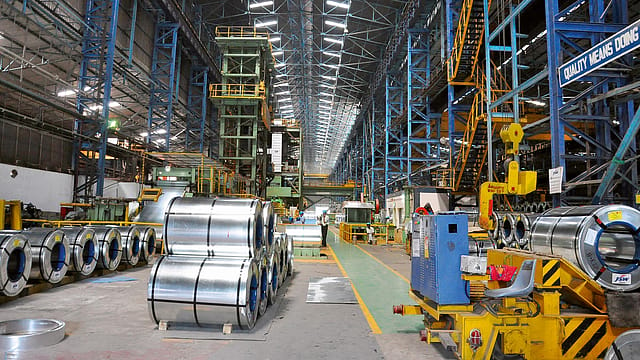2024 Ahoy! Bumpy ride awaits Indian steelmakers
ADVERTISEMENT

It was just three years back when the Chinese were shut due to their zero-Covid policy that Indian steelmakers--- including big players like JSW Steel, Tata Steel and Steel Authority of India (SAIL)--- started discussions on how to chart their global expansion. They exported to the Middle East, Europe and South East Asia at that time and offset the sales dip in the domestic market. The situation is changing and the price war is playing out again, following the re-emergence of Chinese steelmakers with the easing of restrictions in China.
According to industry experts, Chinese steelmakers will pose big challenge to Indian producers on the price front in 2024 as they currently offer hot rolled coils (HRC) at 15-20% discount compared to Indian companies. The HRC price of Indian steelmakers stands at $660-700 a tonne. “It is not an easy price gap to bridge quickly,” says an executive with a steel company.
Chinese started targeting the Indian market too. India's November steel import was at an all-time high of 1.2 million tonnes (MT), Elara Securities said in a report. Domestic steelmakers allege Chinese products are coming into Indian markets through third countries, including Vietnam. It has been raised with the Steel ministry. For instance, Vietnam turned from an importer of Indian steel to an exporter of steel to India.
Experts estimate that China's steel output may rise for the first time in the last three years in 2023 because of the strong vehicle manufacturing and rising steel exports. However, the domestic property sector is yet to pick up after the Covid outbreak. China accounts for about 55% of the world's steel and produced 874.7 MT in the first 10 months of the year, up 1.4% from the same period in 2022.
Morgan Stanley said Indian steel shares may continue to underperform in 2024, as in 2023, because of weak global macro-outlook, higher domestic supply, and unattractive valuations. The price target given by the brokerage for major steel stocks, Tata Steel, JSW Steel, SAIL and Jindal Steel and Power, reflects the potential for downside from current levels.
Despite the backdrop of a soft global economic outlook, the Indian economy remains a bright spot with rising demand across sectors including steel. India’s domestic steel demand grew 13.3% year on year in FY 23, recording consecutive two years of double-digit growth. According to ICRA, domestic steel demand is estimated to grow at a lower level 7-8% in FY 24, thanks to the demand from construction, infrastructure, automobile, real estate, and consumer durables and enabling steel players to maintain high capacity-utilisation levels.
Last year’s business was highly volatile because of macroeconomic issues including the Russia-Ukraine conflict-induced global energy crisis, supply chain tightness and inflationary pressures, semiconductor shortage-related issues, subsequent interest rate hikes by central banks globally, and moderated economic activity in China due to its zero-Covid policy. It has impacted the steel demand-supply balance and resulted in a significant contraction in steel prices. Indian producers were further impacted by the introduction of a 15% export duty from May 2022 till November 2022.
“The synchronised tightening of central bank policies across the globe had an adverse impact on steel demand and led to a decline in steel prices on a global scale. Adding to this, the Indian government imposed duties on domestic steel exports in May 2022, which directly affected the near-term profitability. Furthermore, as global demand remained subdued, India experienced a sharp increase in steel imports, reaching a three-year high of 7 MT,” Sajjan Jindal, chairman, JSW Steel, says in the annual report.
Government of India's focus on infrastructure-led economic growth is expected to support Indian steel makers in 2024, The executives expect an incremental steel demand of 8-10 MT in India next year. The government through its National Steel Policy, envisions a capacity of 300 MTPA in India by FY31, The country has a steel-making capacity of 161 MT at present.
Private steel majors have already lined up huge investments, expecting a surge in demand and a rise in steel prices. Tata Steel aims to double its capacity to 40MT by 2030 with the expansion of its existing steelmaking facilities at Angul, Kalinganagar and Jamshedpur. The capacity doubling expenditure is expected to be ₹1 lakh crore. JSW wants to increase its capacity to 37 MTPA in India by FY25 from 28 MT with a capital expenditure plan of ₹50,000 crore.